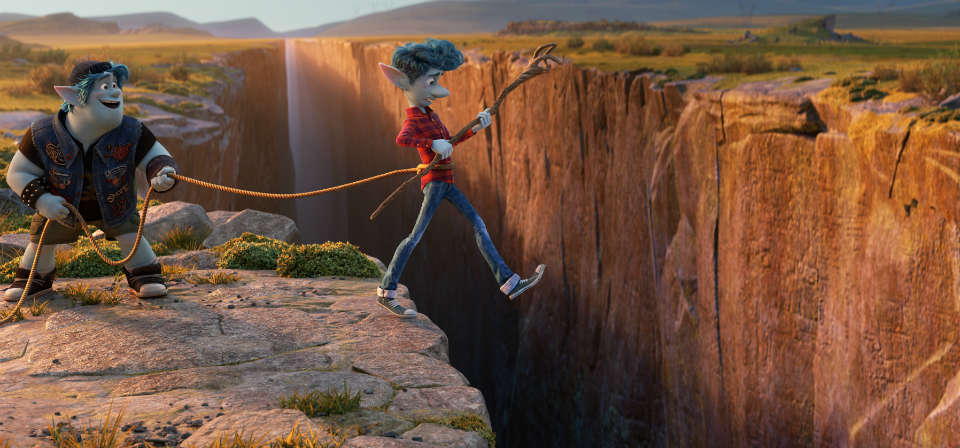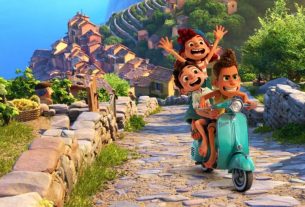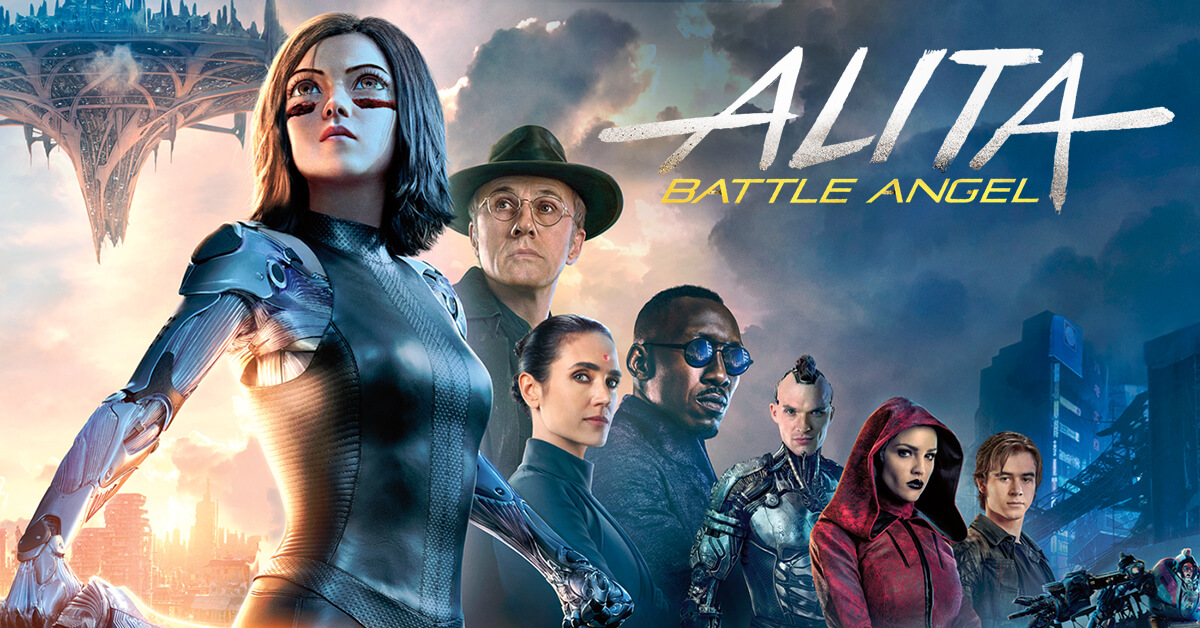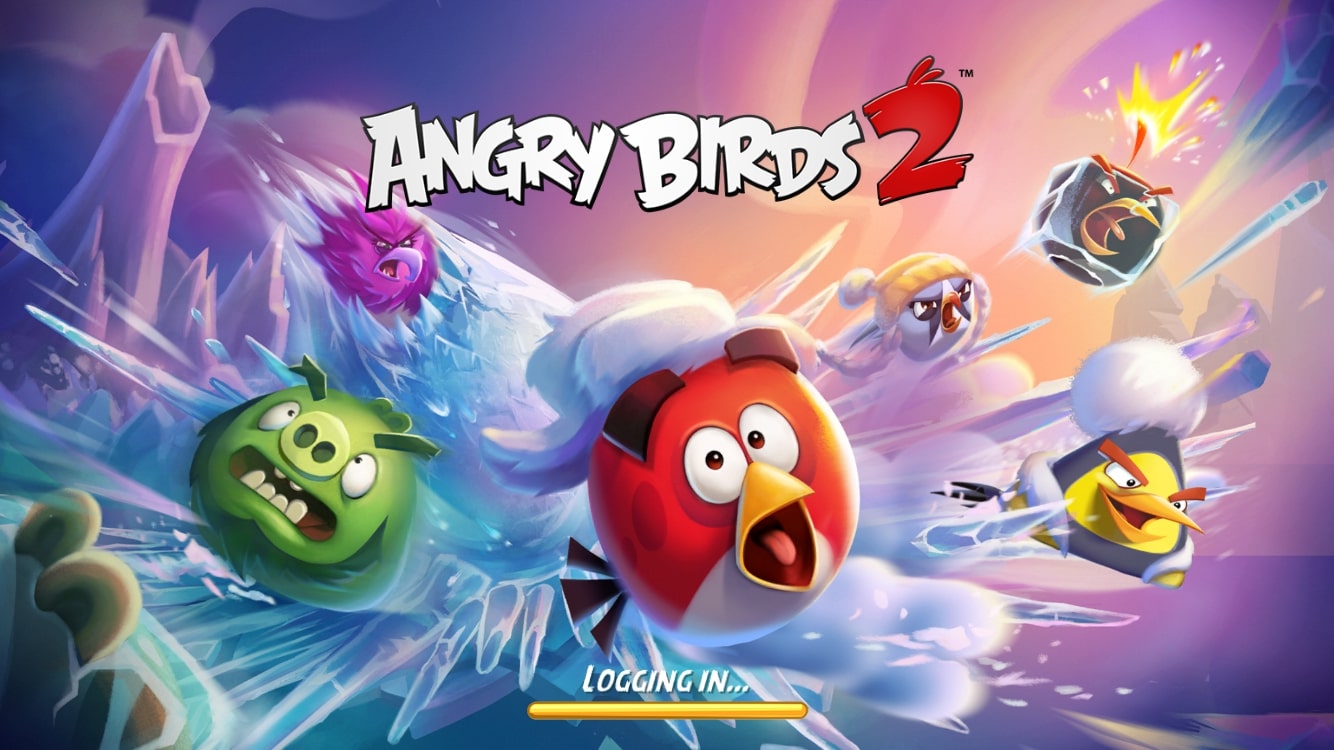In the five years since Inside Out and The Good Dinosaur, Pixar has released only one original feature film: Coco, about a boy who magically journeys to the Land of the Dead and spends a night with a departed paternal ancestor, but must return home at dawn.
Onward, from Dan Scanlon (Monsters University), has twice the boys and half the departed paternal ancestor. The magical journey goes the other way, with the late father returning to the world of the living, and the deadline is sunset rather than sunrise.

If the reunion is more elusive and less emotionally satisfying, in a way that may be the point. What is equally stressed in both stories is the importance of holding onto memories.
Onward seems woven of two disparate creative threads. The first is an emotional yarn involving two teenaged brothers, Ian (Tom Holland) and Barley (Chris Pratt), whose father died when they were very young. This thread was spun from Scanlon’s reflections on his own experience of losing his father when he and his younger brother were little.
The other thread is about the world Ian and Barley live in: a fantasy world in which obsessive teenagers like Barley play fantasy role-playing games, because real magic has mostly gone out of their world.
Magic, it seems, was difficult, and technology was easier, and so little by little the world became less wondrous and more prosaic — though the film is animated by the hope that there’s still a little magic left.
Whatever the origins of this thread, it seems to be of a piece with the anxieties of Cars 3 and Monsters University, in which Lightning McQueen worried about being a has-been, or worse, a sellout, and Mike Wazowski came to terms with leaving greatness to others and being okay just being okay.
The bygone era of Pixar greatness was an era that celebrated greatness, excellence and achievement. Sully and Lightning McQueen were top competitors in their fields. The Incredibles and Remy the rat wrestled with how to express their extraordinary gifts in worlds where they weren’t always appreciated.
For a decade or so now, though, it seems the magic has mostly gone out of the Pixar world.
It’s not the subjects of Pixar’s recent films I resent — on the contrary. There should be more popular movies, including family films, celebrating average people who aren’t superheroes, superspies, Skywalkers, what have you.
The problem is that Pixar’s movies tend to play as metaphors for the creative rise and fall of Pixar itself. When someone says “Maybe this place isn’t as adventurous as it used to be,” it’s hard not to hear an echo of the filmmakers’ voices. Where Up looked up, Onward merely looks onward. Movies about average people don’t have to be average.
Here’s where Onward’s two creative threads overlap: Ian and Barley are elves. Their widowed mother Laurel (Julia Louis-Dreyfus) has a new boyfriend, a mustachioed suburban cop and a centaur named, um, Colt Bronco (Mel Rodriguez). Octavia Spencer voices the owners of a sword and sorcery–themed restaurant, a manticore named, um, Cory. And so on.
Boisterous slacker Barley, with his patched denim vest and spiked wristband, his broken-down van and obsession with RPGing (role-play gaming), seems to have stepped right out of my own youth in the 1980s. He’s got only a few flashbulb memories of their late father, Wilden (Kyle Bornheimer), while timorous young Ian has none at all.
Ian’s 16th birthday is mostly a wash — but everything changes when Laurel brings out a gift that her husband set aside for the boys during his last days. It seems their dad shared Barley’s interest in old-fashioned magic, and managed to dig up a magic staff with a special gem capable of bringing him back to life for a single day.
Barley claims that his extensive knowledge of RPG magic applies to the real world since the game is based on reality. But his own efforts to, um, wield the father’s staff have no effect; it seems he lacks the touch.
Instead, it’s Ian who has the gift, though he doesn’t know how to control it, and what they wind up with is something less than they hoped for.
Dad’s feet appear, followed by his shins, thighs, hips — and then it stops at the beltline. He’s alive and kicking, but no more than that. Unless the brothers can complete a magical quest before the sun sets the next day, 24 hours with his legs is all they’ll get.
This is as weird as it sounds, and the audacity of it recalls in a way the gonzo conceits of Pixar of yore (Up’s balloon house, for instance). Audacity, of course, only takes you so far; you have to pay it off.
Alas, there’s no interest in questioning the implications of this bizarre outcome. How are Dad’s legs able to move and interact without the top half of him? (The legs can’t see what’s going on, but Dad’s thought and personality is behind their movements.)
Is the rest of him conscious and active in some other dimension? (A magical glow glosses the transition between Dad and not-Dad about as gracefully as possible.) Has the spell brought him back from the dead or perhaps brought him forward in time from some point in the past?
Neither Coco nor Onward have any real interest in what ultimately lies after death. The Land of the Dead in Coco was only a waystation on the journey to “the final death,” about which, a sprinkling of Catholic cultural markers notwithstanding, there is no hope of anything but annihilation.
Onward is similarly incurious, not that a pair of legs could answer questions. (Although I tell you, if I were dead and could only communicate with my loved ones with my magically reanimated legs, I would definitely write stuff with my foot.)
Wish-fulfillment stories are always potentially, for some viewers, exercises in cruelty. For young viewers who have lost a parent, the idea of getting their parent back even for a day is an irresistibly attractive premise, one that could be emotionally traumatic for some.
Happily, Onward seems to get that, and the longer Ian and Barley pursue their quest — with Dad’s legs in tow all the time — for a magical McGuffin that will bring the rest of their father back before it’s too late, the more it begins to seem that the journey is more important than the destination.
While acknowledging the reality of grief and loss, Onward ultimately looks for meaning in living relationships with those around us — a theme last seen in Up, another odd-couple road-trip movie that landed with far more emotional impact than Onward.
That might be an unfair comparison, but the fact is that neither shy, anxious Ian nor blustery, insecure Barley is very interesting, or is given much opportunity to grow as a character.
The greatness of many of Pixar’s best films lay in part in cross-examining their flawed protagonists and challenging them to grow morally. Where the standard Hollywood animation convention was to vindicate the misunderstood protagonist, often at the expense of antagonistic parents, Pixar gave us, for example, the jealousy of Woody, the arrogance and secretiveness of Mr. Incredible, Remy’s betrayal of Linguini’s trust, and Merida’s pride and reckless magical violence to her mother.
Are Ian or Barley challenged to grow morally? Perhaps Ian is — but it’s at the expense of challenging Barley.
Ian’s main challenge, besides developing self-confidence and learning to believe in himself, is learning to appreciate his older brother, whose gonzo behavior he finds both exasperating and mortifying. It’s one thing for Ian to recognize that Barley is a more important figure in his life than he realized; it’s another not to recognize that Ian isn’t wrong that Barley should be doing more with his life.
In the end Onward works more than it doesn’t — assuming you can get past the Dad legs running around through most of the movie. Scanlon hits the dramatic and emotional beats effectively enough, and there are nice touches that elevate the film. I appreciate that Ian’s botched attempt to invite classmates to his birthday party isn’t juiced by making the kids cruel or mocking.
The separateness of the film’s creative threads is most clearly seen in the way that supporting characters from Cory and Colt Bronco to the pixie biker gang reconnect their true nature — rediscovering what it means to be a manticore, a centaur, a pixie — but when it comes to Ian and Barley, there’s really no reason for them to be elves at all; nothing for them to discover about their elvish (or elfin) nature. (Ian’s flair for magic is not specifically elvish; wizards come from anywhere.)
Perhaps the most depressing sign of Pixar’s creative decline is the animated short preceding Onward. Historically, as great as many Pixar features have been, it’s been the shorts that have most reliably allowed them to kick back creatively. One Man Band ran circles around Cars; Day & Night was a formal delight in a way that Toy Story 3 couldn’t possibly be; Sanjay’s Super-Team sizzled where The Good Dinosaur stumbled.
Pixar has done disappointing shorts, most egregiously Lava. This time out, though, they aren’t even trying. Instead, Onward has been paired with … a Simpsons short. Coco, likewise, was paired with a Frozen spinoff short starring Olaf. Is this the future for Pixar original features?
Later this year Pixar will unveil yet another dive into life after death: Soul, from Pete Docter, Pixar’s chief creative officer and maker of Inside Out, Up, and Monsters, Inc. — and the only remaining member of Pixar’s original brain trust who has yet to disappoint creatively.
I hope there’s still a little magic left.


